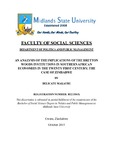Please use this identifier to cite or link to this item:
https://cris.library.msu.ac.zw//handle/11408/2623| Title: | An analysis of the implications of the Bretton Woods Institutions in Southern African economies in the Twenty first century; the case of Zimbabwe | Authors: | Makaure, Delicate | Keywords: | Bretton Woods Institutions Economic conditions Zimbabwe economy |
Issue Date: | 2016 | Publisher: | Midlands State University | Abstract: | The purpose of this research was to investigate the implications of the Bretton Woods Institutions in Southern African economies in the twenty first century using Zimbabwe as a case study.Limited information has been availed regarding the implications of the IMF and WB operations in Zimbabwe and it is the role of this research to fill the void by analyzing various researches and spell it out clearly.The WB and IMF are the two most powerful institutions in global trade.The twenty first century witnessed ailing economies in Southern African countries for example Mozambique,Zambia,Kenya and Zimbabwe.The research made use of the qualitative data collective technique which was subjected to intervene data analysis with various sources of documentary identified.The research findings established that WB prescriptions caused devastating impact to the economy of Southern African Countries.Zimbabwe adoped the ESAP to readdress the economic challenges in 1991,rather ESAP prescriptions had effects to the country’s social service and educational services amongst others.Manufacturing sector collapsed thereby retrenchment became the order of the day. The study concluded that most of the SADC countries including Zimbabwe's economies still reflect the colonial imbalances and the government still has a notion and obligations to pursue policies that seek to achieve fairness and equality.The prescription to retrench the civil service meant that the previously disadvantaged blacks would suffer most as they were the majority employed by the government and the indirect costs would also be great. A reduction in subsidies also failed to take into consideration the historical disadvantages or discrimination of the blacks by the whites. Most of the blacks had little access to health and education, hence subsidies were considered an affirmative action to achieve equity and equality since the majority blacks would also access health and education facilities for free. The study concluded for intense historical study by both the IMF and the WB on one side and the loan facility receiving country on the other side and for the IMF and the WB to prescribe policies that also intend to achieve equity and equality in economic growth.It was also noted that public consultation should take part in implementing policies.Matters of governance are also of greater importance to note for countries with weak institutions should be supported and strengthened to assist them when implementing WB and IMF policies. | URI: | http://hdl.handle.net/11408/2623 |
| Appears in Collections: | Bachelor Of Science In Politics And Public Management Honours Degree |
Files in This Item:
| File | Description | Size | Format | |
|---|---|---|---|---|
| AN ANALYSIS OF THE IMPLICATIONS OF THE BRETTON WOODS.pdf | Full text | 1.12 MB | Adobe PDF |  View/Open |
Page view(s)
28
checked on Jul 26, 2024
Download(s)
34
checked on Jul 26, 2024
Google ScholarTM
Check
Items in MSUIR are protected by copyright, with all rights reserved, unless otherwise indicated.



